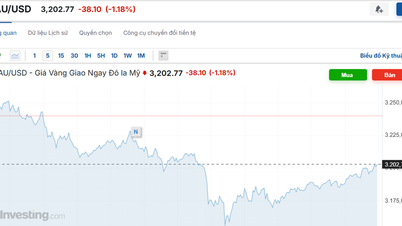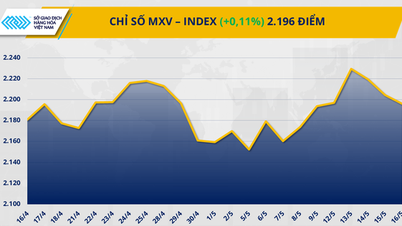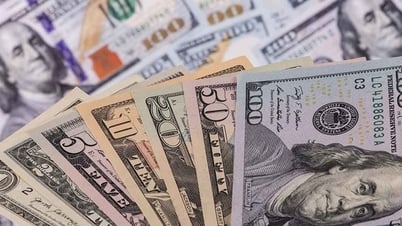World currency exchange rates
In the US market, the US Dollar Index (DXY) measuring the greenback's fluctuations against six major currencies (EUR, JPY, GBP, CAD, SEK, CHF) decreased by 0.57% to 103.69.
The US dollar weakened in the last trading session, after US President Donald Trump began announcing new tariffs.
At the end of the trading session after Mr. Trump reaffirmed that the US would impose a 25% tax on foreign-made cars, the EUR rose to 1.0895 USD, up 0.92% against the greenback, then cooled down and closed the trading session up 0.3%, reaching 1.0828 USD.

Meanwhile, the dollar fell 0.2 percent against the Japanese yen to 149.255 yen after trading higher for most of the session.
President Donald Trump said he would impose a 10% base tariff on all imports into the US, along with higher tariffs on some of the country's largest trading partners. That means all countries and territories will be subject to the same 10% import tax.
At the event, the US President also brought a board showing the tax rates applied to each economy , with tax rates ranging from 10% to 49%. Of which, the UK, Brazil, and Singapore will be subject to a 10% tax. The European Union, Malaysia, Japan, South Korea, and India will be subject to 20-26%. China and Vietnam are among the countries subject to the highest tax rates, at 34% and 46%, respectively.
Against major currencies, the yen regained some of its appeal, despite falling on the day against the euro.
Against the Mexican peso, the dollar was little changed at 20.18. Against the Canadian dollar, the greenback fell 0.1% to 1.421.
Mr Trump's tariff policy is likely to lead to more negotiations in the future to offer concessions to reduce tariffs.
Meanwhile, concerns about the impact of the escalating global trade war on the world's largest economy and a series of weaker-than-expected US economic data have stoked recession fears and weakened the dollar this year.
Amid worries about the tariff announcement, the dollar reacted little to data showing U.S. private payrolls rose more than expected in March. Private payrolls rose by 155,000 last month after rising by 84,000 in February, according to the ADP National Employment Report.
Canadian Prime Minister Mark Carney spoke with Mexican President Claudia Sheinbaum on April 1 about Canada's plans to counter U.S. trade actions, the Prime Minister's Office said.
Meanwhile, Bank of Japan Governor Kazuo Ueda said on April 2 that new US tariffs could have a huge impact on world trade, warning of the potential impact on global growth.
Domestic foreign exchange rates
In the domestic market, at the beginning of the trading session on April 3, the State Bank announced the central exchange rate of the Vietnamese Dong against the USD increased by 16 VND, currently at 23,851 VND.
The reference exchange rate at the State Bank's transaction office increased slightly, currently at: 23,659 VND - 26,043 VND.
USD exchange rates at commercial banks are as follows:
At Vietcombank, the USD exchange rate is 25,430 - 25,820 VND/USD, unchanged in both directions, compared to yesterday's trading session.
HSBC Bank is buying USD cash at the highest price: 1 USD = 25,525 VND
VietinBank is buying USD transfers at the highest price: 1 USD = 25,880 VND
The Japanese Yen exchange rate at the State Bank's exchange office remains unchanged, currently at: 158 VND - 174 VND.
The buying and selling rates of Japanese Yen at commercial banks are as follows:
At Vietcombank, the Vietcombank Japanese Yen exchange rate is 165.17 VND/JPY and the selling rate is 175.66 VND/JPY.
At Vietinbank, the buying and selling Yen exchange rates are equivalent to 167.22 VND/JPY and 176.92 VND/JPY.
At BIDV bank, the buying and selling rates of Japanese Yen reached 167.80 VND/JPY and 175.60 VND/JPY, respectively.
Source: https://baodaknong.vn/ty-gia-ngoai-te-hom-nay-3-4-dong-usd-giam-do-lo-ngai-tang-truong-sau-thue-quan-248111.html


![[Photo] Many young people patiently lined up under the hot sun to receive a special supplement from Nhan Dan Newspaper.](https://vphoto.vietnam.vn/thumb/1200x675/vietnam/resource/IMAGE/2025/5/18/6f19d322f9364f0ebb6fbfe9377842d3)

![[Photo] Party and State leaders attend the special art program "You are Ho Chi Minh"](https://vphoto.vietnam.vn/thumb/1200x675/vietnam/resource/IMAGE/2025/5/18/6895913f94fd4c51aa4564ab14c3f250)
![[Photo] Ready for the top competitions of Vietnamese table tennis](https://vphoto.vietnam.vn/thumb/1200x675/vietnam/resource/IMAGE/2025/5/18/9c547c497c5a4ade8f98c8e7d44f5a41)

![[Photo] Party and State leaders visit President Ho Chi Minh's Mausoleum](https://vphoto.vietnam.vn/thumb/1200x675/vietnam/resource/IMAGE/2025/5/19/d7e02f242af84752902b22a7208674ac)





















































































Comment (0)